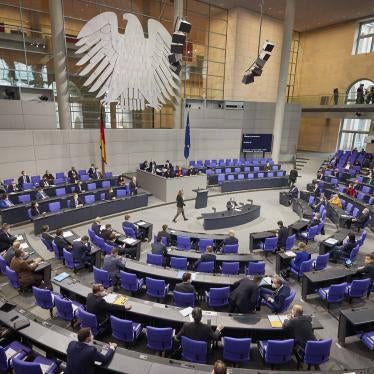(New York) - Human Rights Watch today welcomed an Argentine government decree ensuring courts consider for prosecution all future cases involving former military and police officers. Argentina also announced it will refuse to extradite these officers to other countries. The cases stem from abuses committed under Argentina's military government (1976-1983), during which an estimated 15,000 people were "disappeared."
In the past, the country's two amnesty laws have prevented such prosecutions, but the Federal Court of Buenos Aires recently ruled that the laws were unconstitutional and void. That decision has been appealed to Argentina's Supreme Court, which has the final authority to decide if such cases can go forward.
"The government's decision is a welcome one. We hope Argentina's courts will now play the role they always should have in examining these cases," said José Miguel Vivanco, executive director of the Americas Division of Human Rights Watch. "If the Argentine Supreme Court agrees that the amnesty laws are void, then we should finally see the wall of impunity in Argentina crumble."
The government announced its new policy in a decree published yesterday. On December 11, Human Rights Watch officials met with Argentine President Fernando De la Rua and the ministers of justice and the interior, urging them to adopt such a policy in all cases if the government insisted on maintaining its position rejecting extraditions to other countries on grounds of territoriality.
The decree states that from now on the government will reject all such extradition requests, a policy that, in practice, has already been followed by the Argentine government without exception since the country returned to civilian rule in 1983. Human Rights Watch criticized this policy of noncooperation in its recent report on Argentina's record of prosecuting past human rights abuses.
In recent months, the government has referred to Argentine courts for further investigation charges against former naval officer Alfredo Astiz, after rejecting his extradition to Italy and France. It took a similar decision in the case of eighteen Argentines named in an extradition request from Spain. By explicitly committing to this policy in yesterday's decree, the government has acknowledged Argentina's responsibility to prosecute those accused of grave human rights violations whose extradition it rejects.
Such prosecutions will only be able to go ahead, however, if Argentina's Supreme Court upholds the lower courts' nullification of the country's amnesty laws, the main obstacle to such prosecutions. On November 9, the Federal Court of Buenos Aires ruled unanimously that Argentina's two amnesty laws were unconstitutional and without legal effect. The decision has been appealed to the Supreme Court by two defendants in a "disappearance" case.





